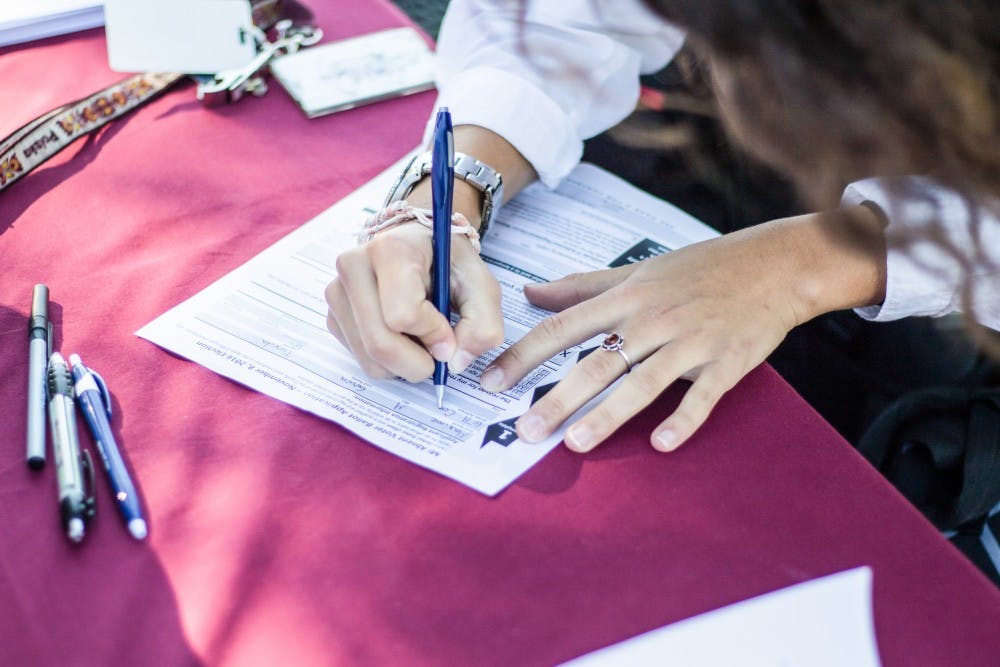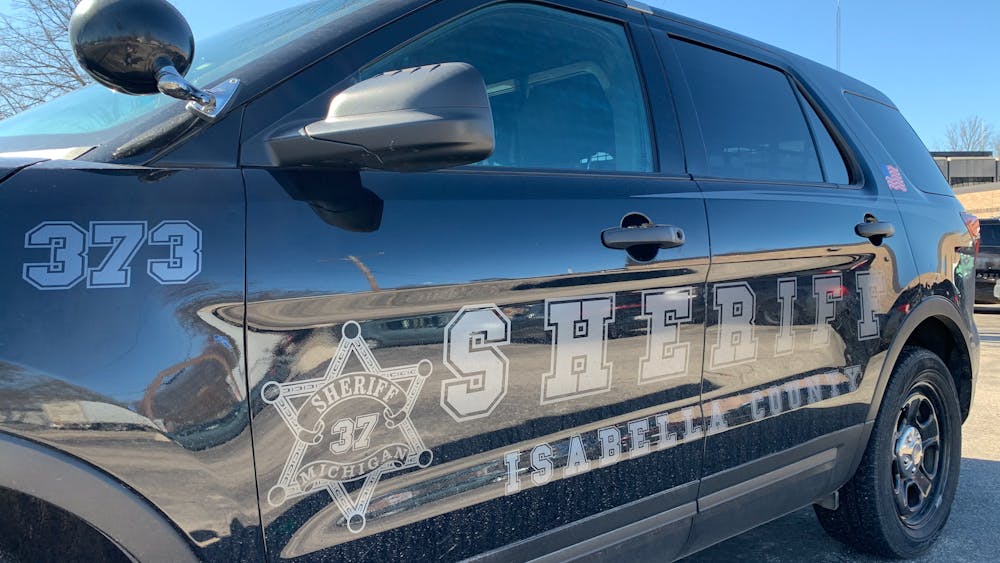Activist groups work to combat barriers to student voting
For Norma Bailey, voting is the great equalizer. She keeps that affirmation in mind every time she oversees a student-voter registration drive or speaks to a class about voting rights.
The retired Central Michigan University professor of middle education now works as a political organizer in Mount Pleasant. She’s also a co-founder of Register Educate Vote (R.E.V.) CMU, a group of faculty, students and city leaders dedicated to getting students to the polls in each election.
Their mission in 2016 was to get 100 percent of CMU’s students registered before the Oct. 11 deadline. It was a task made more difficult by election laws that Bailey calls "modern day suppression tactics."
“We’re very interested in teaching people about voting history because over the course of our history, we’ve expanded who has the right to vote,” Bailey said. “It’s only been within the last 15 to 20 years that we’ve seen a reverse of that.
“Now we’re seeing more voter suppression, and the primary source of suppression occurs with young people.”
Bailey knows those tactics well. Like how under state law, a registered first-time voter must cast a ballot in person before they can vote absentee.
Voting absentee means a person can vote by mail, with some restrictions. If they haven’t voted in person at least once, a student must go home to vote near the address listed on a driver’s license or state ID.
Bailey said confusing election rules are just one type of voter suppression tactics preventing students from turning out on Election Day. The laws culminate a set of barriers that she and others believe erode turnout and faith in the electoral process.
Firing up the youth vote requires activists to convince young people of their own power.
Through registration drives, CMU courses and outreach, Bailey and a band of politically motivated students are working to educate – and deprogram – CMU undergrads as the clock winds down to Nov. 8.
Defining the roadblocks
During the spring 2016 semester, R.E.V. CMU and the Student Government Association brought mobile Secretary of State units to campus. One registration drive in August registered more than 250 students – a sort of milestone by the state’s standard.
Across campus, Rockford senior Evan Wittenbach was doing the same with a different group. Wittenbach is an activist and co-founder of CMU Students for U.S. Sen. Bernie Sanders.
His work registering students gave him deeper insight into barriers to student voting. Barriers like the registration rules, Election Day etiquette, poorly marked polling locations and stymied calls for additional precincts.
“There’s a lot of misinformation out there about how voting works,” Wittenbach said. “Then there’s the fact that students still have to work or attend class on Election Day because it’s not a federal holiday. I have days where I go from 9 a.m. to 9 p.m.
"On a day like that, I want to have time to go out and vote.”
A day off on Nov. 8 might increase youth turnout, but so would lifting restrictions, Wittenbach said. Lawmakers would have to amend or repeal decades of election laws, and Wittenbach isn’t holding out hope on that, either.
“Simple processes aren’t implemented in Michigan because Republicans and establishment Democrats don’t want students voting because they can sway elections, and that’s typically bad for them,” he said.
Loss of faith in process and access
Changing an inconvenient process is one of the key to turning out students who've become lukewarm to the process. It’s why many CMU student activists over the years have lobbied for a polling location on-campus. Each year, the city considers the idea, but eventually disregards it.
That doesn’t mean city staffers haven’t tried to make it work. Mount Pleasant City Clerk Jeremy Howard said the city routinely runs feasibility studies for at least one polling location on campus.
The numbers don’t add up.
Only a quarter of 18 to 21-year-old students are registered to vote in Mount Pleasant’s 6th and 7th precincts. That’s about 700 registered young people out of 3,000 total registered voters, Howard said.
At least 25 percent of CMU’s student population live on campus, less than 6,000 students in total. Howard said there’s no way to know how many of those students are part of that 700 registered pool.
Both Michigan State University and Western Michigan University have on-campus locations. When Howard asked, Kalamazoo and Lansing city clerks did not recommend it as a viable solution.
The study shows it is difficult to justify an on-campus location. It also details students’ sour views on voting. Many have shunned the process entirely. The way politicians treat young people hasn’t helped.
Bailey said politicians dismiss students because they know students won’t vote. It’s a cycle of misunderstanding that hurts young people and lawmakers alike. Wittenbach tends to agree.
“If a student talks about the integrity of the process, they say it doesn’t matter who I vote for,” Wittenbach said. “They think the election is going to be rigged anyway, or it doesn’t matter who gets in because nothing will change for them on the ground.”
U.S. Sen. Debbie Stabenow visited campus last month to speak and campaign for Democratic nominee Hillary Clinton. While at CMU, she cited the registration laws as a major barrier to student voting.
Stabenow said legislators are aware of the rules and are working to change them.
Smashing through the barriers
Registration drives and lobbying are just pieces of the puzzle. Education will play a major role in breaking down the roadblocks to student voting.
In addition to R.E.V., Bailey helped create a one-credit honors course at CMU called Civic Engagement in the 2016 Election.
The course began in Fall 2016. Phame Camarena, director of Honors and National Scholarships Programs, advises the course.
Bailey said the class has only five students, but they’re already making a difference in the community by helping out with registration drives and working on organizing campaigns within the community.
They’re learning about the barriers, the history of voting in America, and most importantly, how to deprogram themselves from voter apathy.
“Young people have been taught that their voice doesn’t count,” Bailey said. “That’s purposeful. We have to make sure they unlearn that.”
R.E.V. and Camarena’s students are planning to march with CMU undergrads to polling locations across Mount Pleasant, ensuring students end up at the right locations.
Howard said the Isabella County I-Ride transportation network plans to add routes to polls specifically for voters.
Wittenbach is optimistic these measures will have an impact on turnout, rules and tactics notwithstanding.
“Taking advantage of that is a good start,” he said. “And who knows. The state could change its laws. City ordinances and charters could change to make campus its own district. No matter what, find time to go out and vote."
Until lawmakers decide to combat barriers to voting with a forceful hand, it’s up to people like Bailey, Wittenbach and students to do everything they can to make sure young people get to the polls.
“In an election like this, it’s especially important to not miss any opportunity to get students involved,” Wittenbach said.




